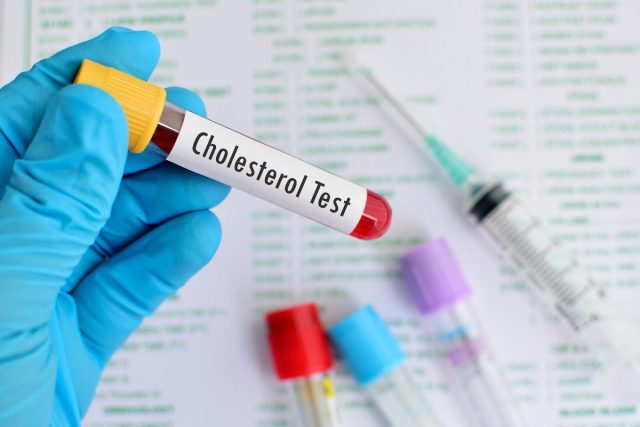Share this @internewscast.com
High cholesterol is a common health issue that affects a staggering amount of people. According to the Centers for Disease Control and Prevention, “Nearly 94 million U.S. adults age 20 or older have total cholesterol levels above 200 mg/dL. Twenty-eight million adults in the United States have total cholesterol levels above 240 mg/dL.” Chances are you or someone you know has high cholesterol and if left untreated can cause serious complications.
Dr. Nikhil Kapoor, MD, FACC, FSCAI, a cardiologist with Dignity Health St. Mary Medical Center, Director of STEMI program, Director of Endovascular Peripheral Interventions, Associate Clinical Professor UCLA School of Medicine tells us, “Cholesterol is one of the key risk factors for development of heart disease, vascular disease and stroke. We know ‘prevention is better than cure.’ And since high cholesterol is so prevalent in the general population, nearly 2 in 5 adults have it in the US. Knowing about it, diagnosing it early and treating it optimally are key to staying healthy. Fortunately, diagnosing high cholesterol can be done with a simple blood test.”
High cholesterol happens when we have too much in our body and it makes blood flow to the arteries difficult. There’s several reasons why this happens and Dr. Kappor explains, “High cholesterol is multifactorial–some factors we can control and others we cannot control. Genetics and family history play a major role. However, lifestyle, unhealthy diet, having diabetes, smoking and lack of exercise/being overweight can impact our cholesterol in a significant way as well. As you can tell from the above, these so called “controllable” factors are interrelated to each other. If we exercise less or are more sedentary and eat unhealthy, we are more likely to be overweight. This in turn predisposes one to develop high cholesterol.” Read on—and to ensure your health and the health of others, don’t miss these Sure Signs You’ve Already Had COVID.


Dr. Sanjeev Aggarwal, cardiovascular surgeon and Medical Advisor at Hello Heart tells us, “According to the CDC, 71 million Americans have high LDL cholesterol, yet fewer than half get treatment likely because they don’t have symptoms. So, I think one of the biggest misconceptions regarding cholesterol and heart disease in general is that there are always tangible, ‘classic’ signs for everyone. Many times this isn’t the case, and risk factors for heart disease such hypertension and high cholesterol do their damage silently.”
Tomi Mitchell, a Board-Certified Family Physician with Holistic Wellness Strategies says, “One common misconception about cholesterol is that it is always bad for you. While it is true that high levels of cholesterol can increase your risk of heart disease, cholesterol is also necessary for the body to function correctly. Cholesterol is a type of fat found in every body cell, and it is used to produce hormones, Vitamin D, and bile acids. Without cholesterol, our bodies would not be able to function correctly. Another misconception about cholesterol is that dietary cholesterol does not affect blood cholesterol levels. Dietary cholesterol has only a small impact on blood cholesterol levels. However, saturated and trans fats can have a much more significant impact on blood cholesterol levels. Finally, some believe statins are the only effective way to lower cholesterol levels. While statins are effective, other lifestyle changes can also help to reduce cholesterol levels. These include eating a healthy diet, exercising regularly, and quitting smoking.”


Dr. Aggarwal says, “Keeping track of lipid panels and using self-measurement blood pressure tools that can easily track and understand their cholesterol levels are a few simple ways to monitor cholesterol levels and identify when levels are too high.”
Dr. Mitchell explains, “High cholesterol is a serious condition that can lead to heart disease and stroke. There are two types of cholesterol: LDL (low-density lipoprotein) and HDL (high-density lipoprotein). LDL is the “bad” cholesterol that contributes to plaque buildup in arteries. HDL is the “good” cholesterol that helps remove LDL from the blood. A cholesterol test can help identify whether you have high cholesterol. The test measures LDL, HDL, and total cholesterol levels in your blood. A score of 240mg/dL or higher is considered high cholesterol. You can lower your risk for high cholesterol by eating a healthy diet, exercising regularly, and avoiding tobacco smoke. If you have high cholesterol, your doctor may prescribe medication to help lower your LDL level. Monitoring your cholesterol levels and taking steps to keep them in a healthy range is a crucial way to reduce your risk for heart disease and stroke.”
Read Related Also: UNDER THE MICROSCOPE: Ex-Made in Chelsea star Binky Felstead, 32, answers our health quiz


According to Dr. Mitchell, “There can be no apparent symptoms of high cholesterol, which is why it is often referred to as a “silent killer.” However, some risk factors can increase your chances of developing the condition. These include being overweight or obese, having diabetes, and smoking. If you have any of these risk factors, it is essential to get your cholesterol checked by a doctor. High cholesterol levels can be detected through a simple blood test. High cholesterol can lead to serious health problems such as heart disease and stroke if left untreated. Therefore, it is essential to be aware of the warning signs and to get checked by a doctor if you are at risk.”
Dr. Kapoor says, ” It is true that high cholesterol does not usually show signs. It is important to remember that cholesterol, inside our body, is essential to maintain good health. However, too much cholesterol, especially bad cholesterol called LDL, is detrimental to us. And since high cholesterol usually affects us slowly, over several years, from my perspective as an interventional cardiologist, it often hurts us by building up inside the walls of our arteries leading to formation of “plaque”, which can lead to heart attack, and stroke. High cholesterol can, occasionally, manifest in subtle physical examination findings like xanthoma (lipid deposits anywhere in the body) and xanthelasma (yellowish deposits on eyelids.) However, for most people it can only be diagnosed via a blood test. “


Dr. Aggarwal explains, “Making small changes and forming healthier habits may help reduce cholesterol and subsequent risk for heart disease. Regular exercise, eating heart healthy foods, and limiting alcohol are simple yet effective ways to keep cholesterol in check.” Dr. Kapoor adds, “Having a sedentary lifestyle, eating unhealthy foods or “junk food” along with other processed foods can predispose one to having high cholesterol. In addition, smoking or using tobacco products can also aggravate the same.”
Dr. Mitchell shares, “There are several ways to lower cholesterol levels naturally. One of the most effective is through diet and exercise. Eating foods low in saturated fat and cholesterol and high in fiber can help reduce cholesterol levels. Exercise helps to improve your lipid profile by lowering LDL (bad) cholesterol and increasing HDL (good) cholesterol. Other lifestyle changes that can help to lower cholesterol levels include quitting smoking and managing stress. In some cases, medications may also be necessary to control cholesterol levels. However, lifestyle changes are often the first step in managing high cholesterol.”


Dr. Aggarwal says, “While there are common risk factors like high blood pressure and high cholesterol that affect everyone, there are some risk factors that have sex-based differences. The normal range of cholesterol readings, specifically high-density lipoprotein (HDL) is different for men and women. Women tend to have a higher HDL than men due to the presence of estrogen.”
According to Dr. Mitchell, “Although cholesterol is often thought of as a problem for middle-aged men, it is a concern for women of all ages. In general, women have higher levels of HDL (good) cholesterol and lower levels of LDL (bad) cholesterol than men. However, after menopause, women’s LDL levels increase and their HDL levels decrease. This change in cholesterol levels may be due to changes in hormone levels during menopause. As a result, postmenopausal women are at higher risk for heart disease than men of the same age. Although cholesterol is a vital part of every cell in the body, too much of it can lead to health problems. By understanding the difference between good and bad cholesterol, and how cholesterol levels change throughout life, women can take steps to keep their hearts healthy.”

















